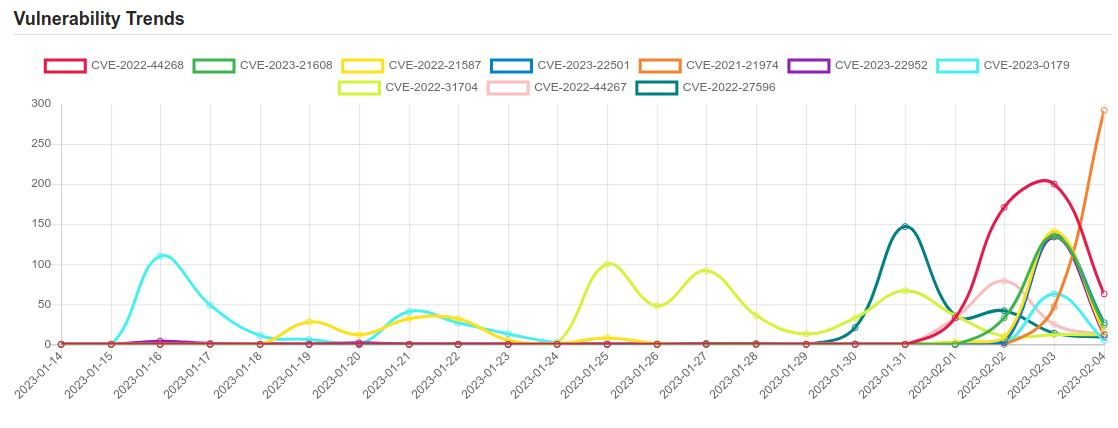Daily Vulnerability Trends: Sun Feb 05 2023

| CVE NAME | CVE Description |
| CVE-2019-2215 | A use-after-free in binder.c allows an elevation of privilege from an application to the Linux Kernel. No user interaction is required to exploit this vulnerability, however exploitation does require either the installation of a malicious local application or a separate vulnerability in a network facing application.Product: AndroidAndroid ID: A-141720095 |
| CVE-2022-47986 | No description provided |
| CVE-2020-3992 | OpenSLP as used in VMware ESXi (7.0 before ESXi_7.0.1-0.0.16850804, 6.7 before ESXi670-202010401-SG, 6.5 before ESXi650-202010401-SG) has a use-after-free issue. A malicious actor residing in the management network who has access to port 427 on an ESXi machine may be able to trigger a use-after-free in the OpenSLP service resulting in remote code execution. |
| CVE-2023-25135 | vBulletin before 5.6.9 PL1 allows an unauthenticated remote attacker to execute arbitrary code via a crafted HTTP request that triggers deserialization. This occurs because verify_serialized checks that a value is serialized by calling unserialize and then checking for errors. The fixed versions are 5.6.7 PL1, 5.6.8 PL1, and 5.6.9 PL1. |
| CVE-2023-22374 | In BIG-IP starting in versions 17.0.0, 16.1.2.2, 15.1.5.1, 14.1.4.6, and 13.1.5 on their respective branches, a format string vulnerability exists in iControl SOAP that allows an authenticated attacker to crash the iControl SOAP CGI process or, potentially execute arbitrary code. In appliance mode BIG-IP, a successful exploit of this vulnerability can allow the attacker to cross a security boundary. Note: Software versions which have reached End of Technical Support (EoTS) are not evaluated. |
| CVE-2023-0045 | No description provided |
| CVE-2023-20854 | VMware Workstation contains an arbitrary file deletion vulnerability. A malicious actor with local user privileges on the victim’s machine may exploit this vulnerability to delete arbitrary files from the file system of the machine on which Workstation is installed. |
| CVE-2022-44268 | No description provided |
| CVE-2023-21608 | Adobe Acrobat Reader versions 22.003.20282 (and earlier), 22.003.20281 (and earlier) and 20.005.30418 (and earlier) are affected by a Use After Free vulnerability that could result in arbitrary code execution in the context of the current user. Exploitation of this issue requires user interaction in that a victim must open a malicious file. |
| CVE-2022-21587 | Vulnerability in the Oracle Web Applications Desktop Integrator product of Oracle E-Business Suite (component: Upload). Supported versions that are affected are 12.2.3-12.2.11. Easily exploitable vulnerability allows unauthenticated attacker with network access via HTTP to compromise Oracle Web Applications Desktop Integrator. Successful attacks of this vulnerability can result in takeover of Oracle Web Applications Desktop Integrator. CVSS 3.1 Base Score 9.8 (Confidentiality, Integrity and Availability impacts). CVSS Vector: (CVSS:3.1/AV:N/AC:L/PR:N/UI:N/S:U/C:H/I:H/A:H). |
| CVE-2023-22501 | An authentication vulnerability was discovered in Jira Service Management Server and Data Center which allows an attacker to impersonate another user and gain access to a Jira Service Management instance under certain circumstances_._ With write access to a User Directory and outgoing email enabled on a Jira Service Management instance, an attacker could gain access to signup tokens sent to users with accounts that have never been logged into. Access to these tokens can be obtained in two cases: * If the attacker is included on Jira issues or requests with these users, or * If the attacker is forwarded or otherwise gains access to emails containing a “View Request” link from these users. Bot accounts are particularly susceptible to this scenario. On instances with single sign-on, external customer accounts can be affected in projects where anyone can create their own account. |
| CVE-2021-21974 | OpenSLP as used in ESXi (7.0 before ESXi70U1c-17325551, 6.7 before ESXi670-202102401-SG, 6.5 before ESXi650-202102101-SG) has a heap-overflow vulnerability. A malicious actor residing within the same network segment as ESXi who has access to port 427 may be able to trigger the heap-overflow issue in OpenSLP service resulting in remote code execution. |
| CVE-2023-22952 | In SugarCRM before 12.0. Hotfix 91155, a crafted request can inject custom PHP code through the EmailTemplates because of missing input validation. |
| CVE-2023-0179 | No description provided |
| CVE-2022-31704 | The vRealize Log Insight contains a broken access control vulnerability. An unauthenticated malicious actor can remotely inject code into sensitive files of an impacted appliance which can result in remote code execution. |
A considerable amount of time and effort goes into maintaining this website, creating backend automation and creating new features and content for you to make actionable intelligence decisions. Everyone that supports the site helps enable new functionality.
If you like the site, please support us on Patreon using the button below

To keep up to date follow us on the below channels.





![Cobalt Strike Beacon Detected - 166[.]88[.]2[.]184:80 7 Cobalt-Strike](https://www.redpacketsecurity.com/wp-content/uploads/2021/11/Cobalt-Strike-300x201.jpg)
